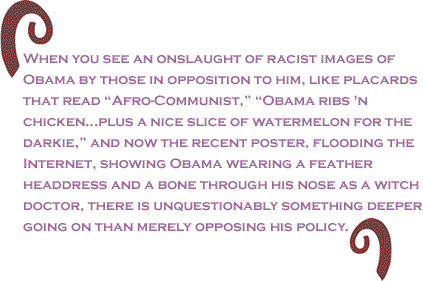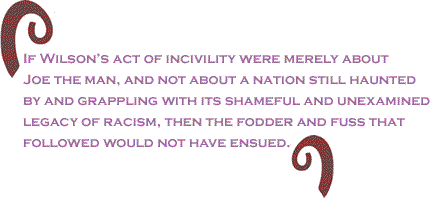
|
||||||||||||||||||||||

|
|
 |
|
If we resided in a post-racial society then William Faulkner’s words uttered in the 20th century would not ring true in this century-"The past isn't dead and buried. In fact, it isn’t even past.” With the election of Barack Obama as this nation’s first African-American president many of us had hope we could finally close the door on America’s original sin-slavery. But the vestiges of that institution lingers not only in the backwaters of America, but they also linger in the hallow halls of Congress. When South Carolina Republican House Rep. Joe Wilson’s belted out “You lie!” during Obama’s televised joint session of Congress address, Wilson jolted us back to Faulkner’s words. If Wilson’s act of incivility were merely about Joe the man, and not about a nation still haunted by and grappling with its shameful and unexamined legacy of racism, then the fodder and fuss that followed would not have ensued. As a mater-of-fact, we could have viewed Joe’s outburst as all about him, an impassioned man in opposition to Obama’s current political discussions. After all, I too, find Obama’s healthcare plan and government spending to be a brow raiser.
And When you have a Birther Movement promulgating lies that Obama wasn’t born in the U.S., Tea Party protests with guns at its rallies, and a vicious right-wing contingent blocking the President of the United States from delivering an innocuous back-to-school speech encouraging America’s children to stay in school, we are seeing strong efforts at play to delegitimize Obama’s authority. And of course the specter of race surfaces. You must ask, how much does race play a key factor and not a backdrop to Obama’s policy decisions? And, like any unresolved conflict, the warts and boils bubble up, unseeingly, out of nowhere. “Racism ... still exists and I think it has bubbled up to the surface because of a belief among many white people, not just in the south but around the country, that African-Americans are not qualified to lead this great country. It’s an abominable circumstance and grieves me and concerns me very deeply,” former President Jimmy Carter told NBC News. Whereas Carter thinks race is indeed the underlying issue Obama thinks otherwise. “Now there are some who are, setting aside the issue of race, actually I think are more passionate about the idea of whether government can do anything right,” he told ABC News. “And I think that that’s probably the biggest driver of some of the vitriol.”
In February Holder received scathing criticism for his speech on race. He’s critics said the tone and tenor of the speech was confrontational and accusatory. “Though this nation has proudly thought of itself as an ethnic melting pot,” Holder said, “in things racial we have always been and continue to be, in too many ways, essentially a nation of cowards.” Obama is part of a new generation of African- American male leaders who come after the 60’s. They would argue that they don’t flee from race issues, but rather they don’t employ the black civil rights movement paradigm, often viewed as confrontational, to enter into mainstream politics. And they are heralded as American’s post-racial leaders who successfully navigate through this country's lingering legacy of racism with the intent purpose of disarming whites of their guilt and fears.
Peter Boyer’s article in the February 4, 2008 issue of The New Yorker titled “The Color of Politics: A Mayor of the Post-Racial Generation” wrote the following explaining this “post-racial” generation of African Americans that includes Barack Obama, Harold Ford, Cory Booker, and my governor, Deval Patrick: “Their deeper kinship resides in their identities as breakthrough figures – Africa American politicians whose appeal transcends race. Men reared in the post-Selma era and schooled at elite institutions, developed a political style of conciliation rather than confrontation, which complemented their natural gifts and, as it happens, nicely served their ambitions.” This political style these men employ Shelby Steele depicts it best in his recent book “A BOUND MAN.” Steele states that, in the African American community, there are two types of people – the “bargainer” and the “challenger.” What is a “bargainer” or a “challenger?” According to Shelby Steele, a bargainer strikes a bargain with white America in which they say I will not rub America’s ugly history of racism in our face if you will not hold my race against me. A “challenger,” on the other hand, does the opposite of a “bargainer.” A “challenger” charges white people with inherent racism and then demands they prove themselves innocent by supporting black friendly polices like affirmative action and diversity. No matter what kind of shape-shifters or mask-wearers we are as African Americans leaders, even our post-racial leaders are finding out that the nagging issue of race is an unavoidable issue. And our attempts to dodge the issue of race in American public discourse is itself a racial act. And the reason race bubbles up to the surface, unseeingly out of nowhere, is because it is the conversation America won't have.
BlackCommentator.com
Editorial Board member, the Rev. Irene Monroe, is a religion columnist,
theologian, and public speaker. A native of Brooklyn, Rev. Monroe
is a graduate from Wellesley College and Union Theological Seminary
at Columbia University, and served as a pastor at an African-American
church before coming to Harvard Divinity School for her doctorate
as a Ford Fellow. Reverend Monroe is the author of Let Your Light Shine Like a Rainbow Always: Meditations on Bible
Prayers for Not-So-Everyday Moments |
|
 |
|
Any BlackCommentator.com article may be re-printed so long as it is re-printed in its entirety and full credit given to the author and www.BlackCommentator.com. If the re-print is on the Internet we additionally request a link back to the original piece on our Website. Your comments are always welcome. eMail re-print notice
If you send us an eMail message we may publish all or part of it, unless you tell us it is not for publication. You may also request that we withhold your name. Thank you very much for your readership. |
|
| |
|
| September24
, 2009 Issue 343 |
|
| Executive Editor: Bill Fletcher, Jr. |
| Managing Editor: Nancy Littlefield |
| Publisher: Peter Gamble |
| Est. April 5, 2002 |
Printer Friendly Version
in resizeable plain
text format or pdf
format. |
 |

|
| |
| |










































